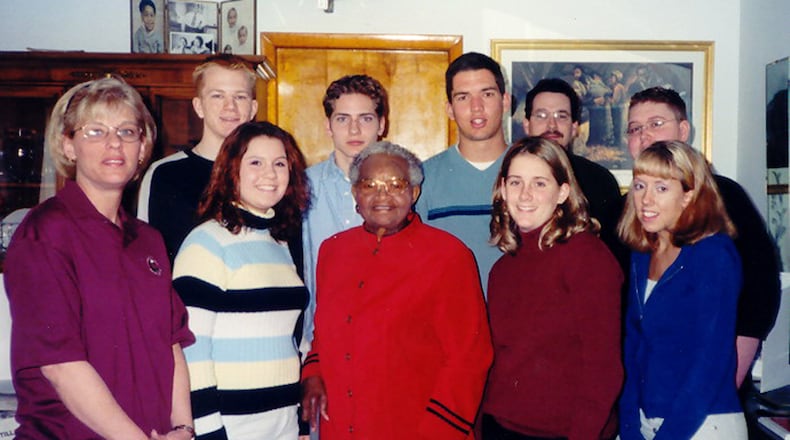“We felt the weight of responsibility, and, in response, a small group of teachers believed this was the opportunity to teach students about racism in the United States,” said John Wilson, then a social studies teacher at the school.
“I had spent four summers living in North Lawndale, on the West Side of Chicago in a predominantly African American community, living at their community center, working on construction projects during the day and evenings at the center.
“Along with other teachers, we decided to take a group of students there, immersing them in an entirely different culture than their own. I made arrangements for them to stay in the North Lawndale community center, doing educational things during the days, then coming back and working with kids at the center.”
Wilson developed a curriculum for what he called The Chicago Project. “Our first group went to Chicago during spring break of 1999. After that trip, I met with Congressman Tony Hall, who had met Mamie Till, the mother of Emmett, who was brutally beaten and lynched when he was visiting cousins in Mississippi, and he gave me her number.
“On the 2000 trip, I called her and we showed up at her house — it was very spontaneous, and she invited us in.
“She was very generous and told students about the pictures all around her house, the story of the murder of her 14-year-old son and her efforts to create awareness.” The pictures included Emmett in his open casket, which she insisted on to show people what racism had done to her son.
“The kids asked some very personal questions and so did she. She wanted the kids to understand how bad and ugly racism is and its personal cost.
“She was incredibly gracious, and spent two-to-three hours, not just telling, but, as a former teacher, making sure they understood.”
New students returned to her home in 2001 and 2002. “I went back that last summer in August with another school’s film crew and recorded her interview,” said Wilson. Mamie died just months later, in January 2003, and Wilson attended her funeral, sitting next to Keith Beauchamp, a producer of the recent film “Till.”
Emily Earl, a teacher at West Carrollton High School, was in the class of 2001 and vividly recalls the visit with Mamie. “We had researched Mamie Till and her son, Emmett, so (we) had the historical perspective,” she said.
“And, in Chicago, we visited a Black church and stayed in the community center to immerse ourselves in their culture and learn from it.
“But the visit with Mrs. Till and impression her living room — with all the pictures of her son — had on us, and her telling his story, made a much bigger impact. She was very warm, and it was like sitting in your grandmother’s living room while she shared her emotions and feelings, hearing first-hand her recollection of events.
“Since then, I have been totally invested in educating my friends, students and son about understanding the values of others and what they have to offer instead of being ignorant to different cultures.”
Wilson has seen the film “Till,” which opened here in October and is showing in the United Kingdom now, and says: “It’s spot on, and really demonstrates that Mamie was deeply caring, committed to civil rights and justice, and to sharing the story of her son, and she was courageous in doing that. They portrayed her well, without romanticizing her, and captured the essence of her as a person, a force to drive change.”
Contact this writer at virgburroughs@gmail.com
About the Author



